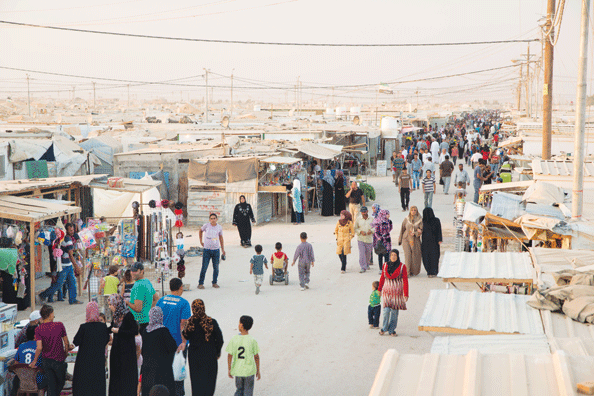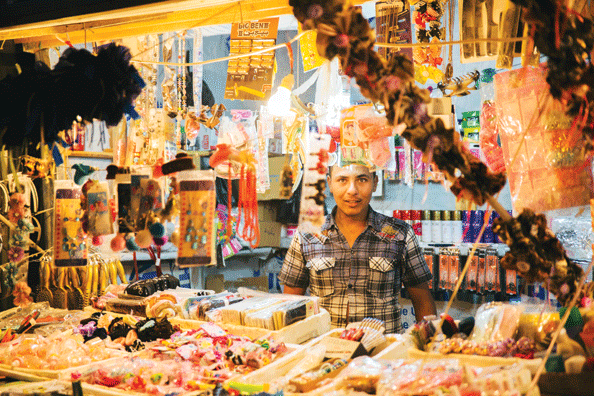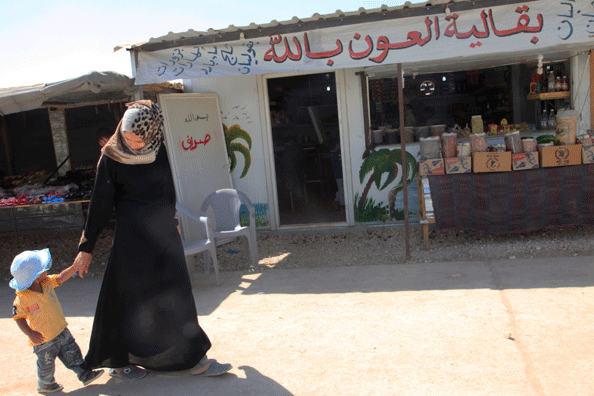The conflict in Syria shows no sign of slowing. But while the people of Zaatari refugee camp may have lost their homes, they’ve built a new city with a micro-economy worth Dhs53 million
The most famous street in the city is also the busiest. Street lamps illuminate shops and restaurants that show no sign of closing, despite the glow of an imminent sunset. People congregate near popular clothing boutiques, while diners look for a slice of pizza on their way home. It’s been another busy day of trading, but the ‘Champs-Élysée’ isn’t quite ready to sleep. After all, this is the world’s second biggest refugee camp, and there’s little time to relax.
Despite being established as an emergency shelter for victims of the war in Syria, Zaatari refugee camp in Jordan has a flourishing micro-economy. The so-called Champs-Élysée was playfully named by staff from United Nations High Commissioner for Refugees (UNHCR), who drew parallels to the bustle of Paris’ famous street. The gross domestic product of this massive compound is almost Dhs53 million per month, and profits like that don’t just come through the trade of bare essentials. There are bicycle shops, hardware stores, furniture shops, shoe stalls and plethora of fashion outlets. One of the most lucrative business ventures is a wedding boutique.
“In a settlement with 100,000 people, weddings are an important factor,” says Kilian Kleinschmidt, camp boss for UNHCR. “You can rent wedding dresses for about 15 dinars (Dhs77) per day. The night gowns and lingerie you have to buy.” With two dress-hire shops and almost 10 weddings per month, it’s fair to say business is good. The shops, which are both owned by the same businessman, are doing so well that they’ve even branched out into beauty products and accessories.
It hasn’t always been this way. When Zaatari was established in July 2012, the focus was on survival rather than quality of life. Back then, many Syrian refugees referred to the camp as the “hell hole” and those who could afford to leave either took their chances on retuning to Syria or entered into Jordan illegally. It was a harsh existence – it still is – but events like weddings have given people an excuse to smile.
“Through the weddings people learn to enjoy life again,” explains Kilian. “We had a problem at the beginning because happy events weren’t looked upon well. The attitude was: ‘People are dying in Syria, why are you happy?’” Paying penance for something you’ve escaped from may sound futile, but considering that most people in Zaatari have loved ones fighting in the war, or have lost friends and family to conflict, it’s easy to see why this attitude was expected.
Kilian explains that it’s difficult to forget about the war, because they are reminded of it every day. “The war being so close – you can hear it,” he explains. “You can hear the artillery fire.” With the sound of conflict providing a backdrop to everyday life, people felt they needed justification to be happy. “Weddings became fashionable because it was a moment of fun for the families. Psychologically it’s important to have these other moments.”
The mental battle the people of Zaatari face while the war continues is clear. In the past year Syrian forces and fighters have shown no sign of ceasefire, which has led the refugees to accept a frightening realisation: this temporary home may not be so temporary. While that’s certainly not the scenario anyone hoped for, it does have one positive: people are actually starting to take pride in the camp, and nowhere is that more apparent than along the Champs-Élysée.
“Different types of shops were coming up [after the refugees accepted they would be in Zaatari for some time]. Housing was developed. Lots of hardware stores started to appear on the Champs-Élysée,” says Kilian of the shift in attitude, which began last June. “More washing machines were being sold – we have about 3,000 washing machines in the camp now. Over 50 per cent of the refugees have a TV. About 75 per cent of the camp has a private toilet. Almost 80 per cent have private electricity through an illegal connection. All of that has happened at an incredible speed.”
Speed is the optimum word considering the camp now has around 3,500 shops. Showcasing the entrepreneurial prowess of the refugees – many of whom, according to Kilian, were traders or illegal smugglers in Syria – shops reflect a diverse community. In an effort to utilise skills and create a home-from-home, many have set up businesses based on their previous profession. The most recent example of this is a travel agency.
“He was a travel agent at home in Syria and he’s organising travel for Syrians who want to visit Zaatari camp,” explains Kilian. “They come from abroad as there are lots of men working away and they want to come and visit their families here [in Zaatari]. There is a pick-up service at the airport to take them to the camp.” Much like any normal city, people fill skill shortages, spot gaps in the market, and do what they can to earn for their families.
That doesn’t mean that the structure of this pseudo-city is perfect. All of the shops are currently illegal, stealing electricity and water, which can mean supplies aren’t evenly distributed among refugees. Of course, the stock rotation of shops wouldn’t be possible without business partners, who often come from Jordan. “Because many [refugees] are from Daraa [in Syria], many were involved in smuggling, so they are linked to northern Jordan populations, including the traders,” says Kilian. “When the camp started to settle, they started setting up shops with support and help from their Jordanian friends.”
There are legitimate similarities to a city among the rogue traders. The camp has two international supermarkets, where people shop for their food rather than queuing up to receive handouts. Systems are being put in place so that those who can afford to pay for services do, and help is available for those who can’t, which sounds more like social welfare than emergency aid. Kilian proudly tells us that UNHCR is working closely with the city of Amsterdam to develop Zaatari further. Future plans include a transport system, paid electricity and a proper water supply. It sounds worlds away from a refugee camp, which comes as a welcome change to inhabitants desperate to shake the ‘refugee’ label and become known simply as ‘people’ again. Jordanians are a little more conflicted on the matter – many of them are keen to ensure Zaatari doesn’t take over a large proportion of their country, while many are reliant on the Champs-Élysée for trade.
Legal or not, the important thing about Champs-Élysée is that it has enabled Zaatari refugees to enjoy life again. “There is so much to discover here,” Kilian delights in telling us. “I was just in a house where the family invest everything they have into plants and animals. They have two fish tanks, they have rabbits, they have ducks, they have chickens, cats and so on. They have fountains, they have a vegetable garden. It’s fascinating.”
Zaatari is now moving into the next phase of development, where people work, live and behave in a manner that reflects some form of normality: dressing up for social occasions, visiting neighbours, earning money, saving for luxuries, choosing what to eat in the evening. But Kilian doesn’t credit this shift to UNHCR – he’s much more humble than that. “As I always say,” he explains matter-of-factly, “we built a camp; they built a city.”
To find out more about UNHCR visit unhcr.org. For updates on Zaatari follow @ZaatariCamp
Images: Jared Kohler/UNHCR and DFID/Flickr















